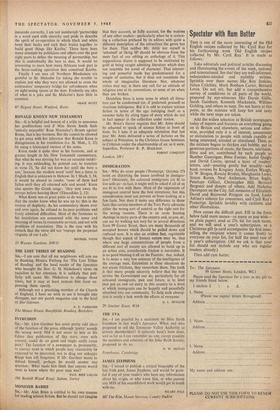RONALD KNOX'S NEW TESTAMENT
is helpful and honest of a critic to announce her predilections and if Miss Stevie Smith finds 'entirely enjoyable' Rose Macaulay's thrusts against Rome, that is her business. But she cannot be allowed to get away with her inference that Ronald Knox is disingenuous in his translation (i.e. St. Matt., 1, 25) by using a telescoped version of his notes.
Knox made it quite clear in his footnote, and at greater length in his New Testament commentary, that what he was striving for was an accurate render- ing. It was misleading, he pointed out, to translate in verse 25, 'he did not know her until she bore a son,' because the modern word 'until' has a force in English that is unknown in Hebrew. In 1 Mach. 5, 54, it would be absurd to render, 'none of them had fallen until they all returned safe and sound.' Knox also quotes the Greek usage : 'they sent away the envoys before hearing them' (Thucydides 2, I2).
What Knox was at great pains to do was to ensure that the reader knew what he was up to; this is the reverse of duplicity. As his commentary shows over and over again, he refused to by-pass problems and freely admitted difficulties. Most of the footnotes to his translation are concerned with the sense and meaning of verses (a reasonable service), and not with problems of translation. This is the case with his remark that the verse did not 'impugn the perpetual virginity of our Lady.'
13 Wessex Gardens, NW II
MICHAEL IVENS














































 Previous page
Previous page